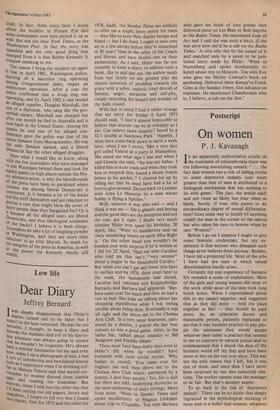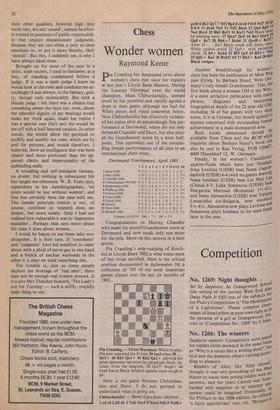Postscript
On women
P. J. Kavanagh
In an apparently authoritative article on the treatment of schizophrenia there was the following astonishing remark: ... the fact that women run a risk of falling victim to some depressive malady four times greater than that of men is attributed to a biological mechanism that has nothing to do with genes.' The fact, the article said; and not twice as likely but four times as likely. Surely, if true, this points to an extraordinary degree of sexual differentia- tion? Goes some way to justify (if anything could) the man in the corner of the saloon bar who raises his eyes to heaven when he says 'Women!'
Before I go on I suppose I ought to give some feminist credentials; but my ex- perience is that anyone who demands such things never believes them anyway. Besides, I have led a protected life. Most of the jobs I have had are ones in which sexual discrimination hardly arises.
Certainly my one experience of business life revealed a scene of exploitation. Most of the girls and young women did most of the work while most of the men took long lunch hours. When I expostulated about this to my (male) superior, and suggested that as they did more — held the place together in fact — they should be paid more, he, an otherwise decent and reasonable person, patiently explained to me that it was business practice to pay peo- ple the minimum they would accept whatever their value: a practice that seemed to me so contrary to natural justice and to commonsense that I shook the dust of the business world off my feet and have been more or less on the run ever since. This was not the only reason that I left, but it was one of them, and since then 1 have never been surprised by our dire industrial rela- tions. The worker cannot trust the manager to be fair. But that's another matter.
To go back to the risk of 'depressive malady'. There can be no doubt that deeply ingrained in the mythological thinking of most men is a belief that women, whatever their other qualities, however high their work-rate, are not 'sound', cannot be whol- ly trusted in positions of public responsibili- ty that require dispassionate judgment, because they are too often a prey to their emotions or, to put it more bluntly, their 'moods'. But this, I suddenly see, is why I have always liked them.
Brought up for most of the year in a strict, male society, I used to fantasise, as a boy, of standing condemned before a judge. If it was a male judge I knew he would look at the rules and condemn me ac- cordingly (I was always, in the fantasy, guil- ty, though only technically). But with a female judge I felt there was a chance that something about the facts (or, even, about the splendid dignity of my bearing) would make her think again, make her realise I was a special case (ha!) and she would let me off with a half-hearted caution. In other words, she would allow the personal to mollify and modify the rules, which are by and for persons, and would therefore, I believed, show an intelligence that was both clearer and more profound than the ap- parent clarity and impersonality of the unbending male.
A revealing and self-indulgent fantasy, no doubt; but nothing in subsequent life has taught me otherwise. W. B. Yeats says, somewhere in his Autobiographies, 'we poets would be lost without women', and that has certainly been the case with me. The female principle (which is not, of course, confined to women) does see deeper, feel more widely. Only I had not realised how vulnerable it was to 'depressive maladies'. Perhaps that says more about life than it does about women.
I would be happy to see them take over altogether. It is their turn. If 'soundness' and 'judgment' have led mankind to caper about with a phial of nerve-gas in one hand and a bunch of nuclear warheads in the other it is time we tried something else.
The trouble is, just as some people deplore the shortage of 'real men', there may not be enough real women around. It is a pity Mrs Thatcher boasted, 'The Lady's not for Turning' — such a stiffly, stupidly male thing to say.











































 Previous page
Previous page